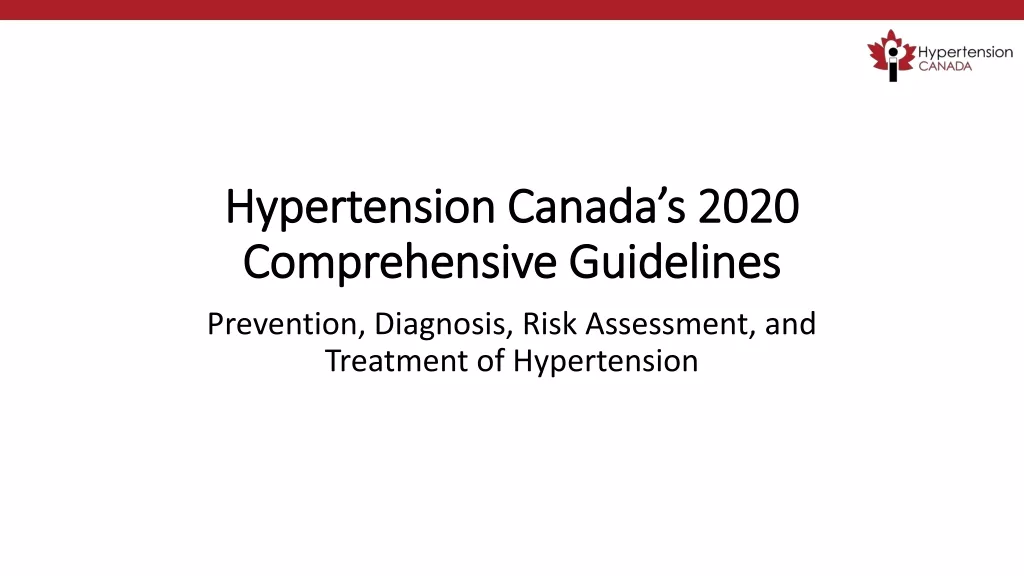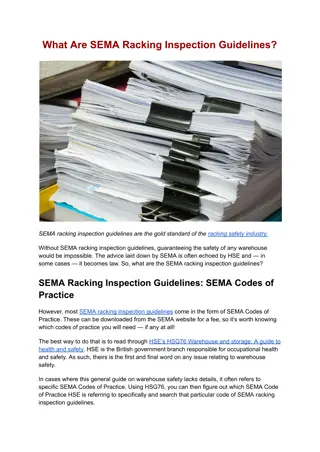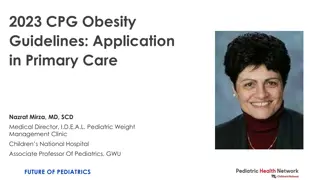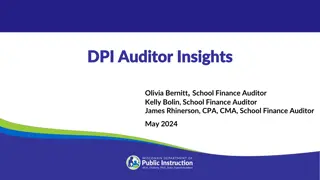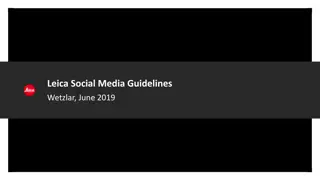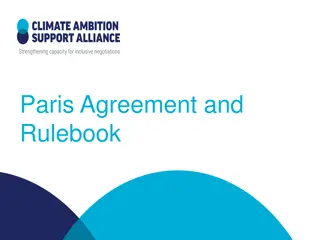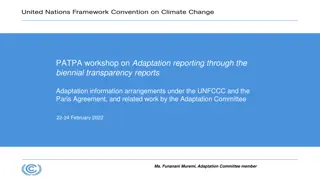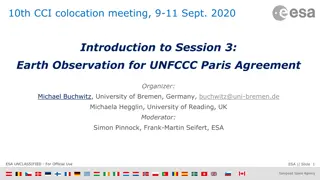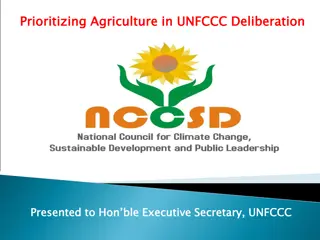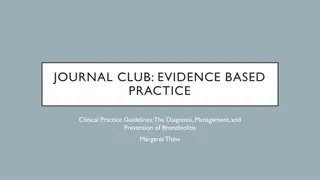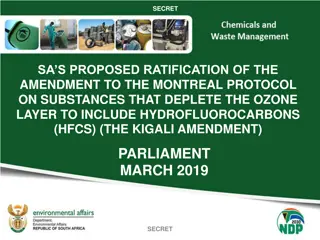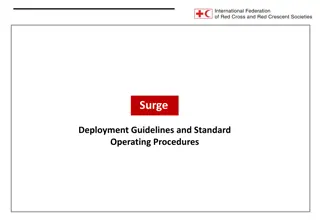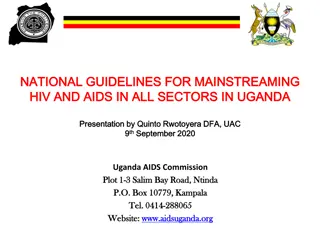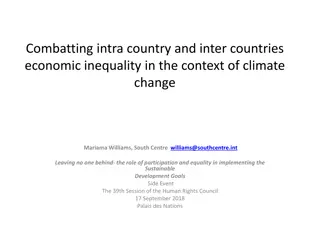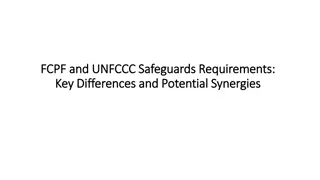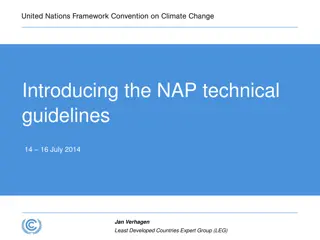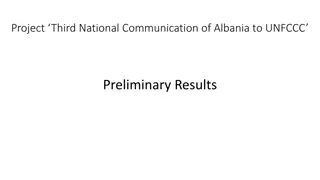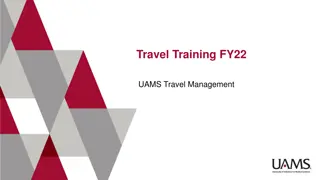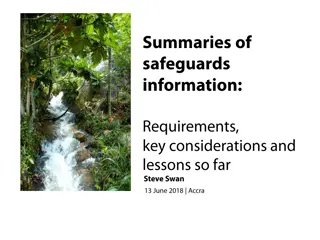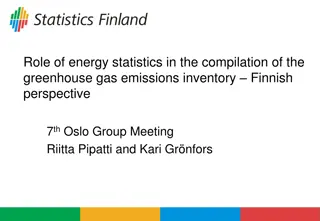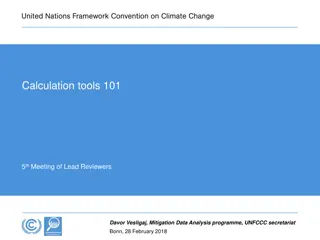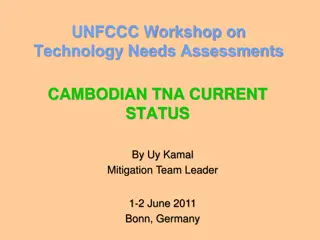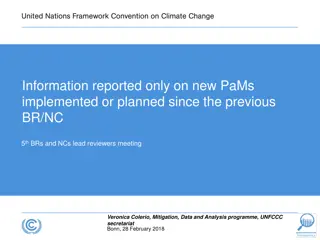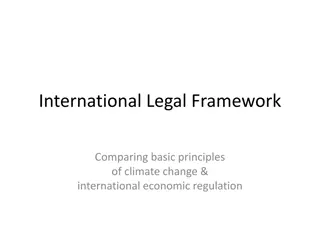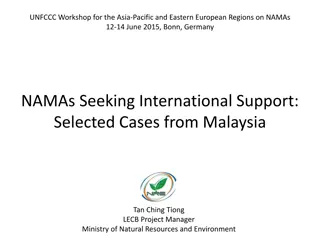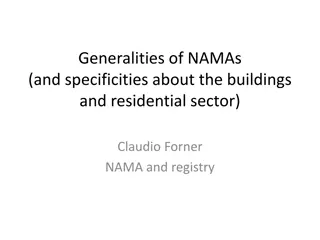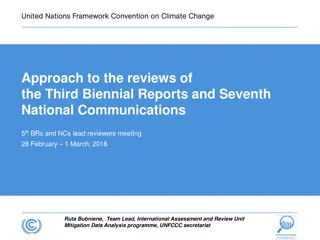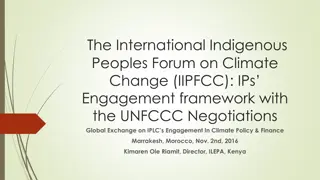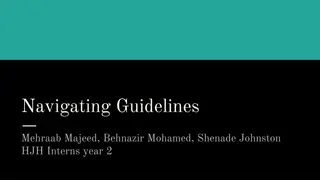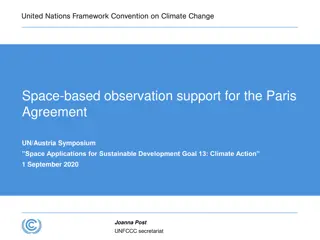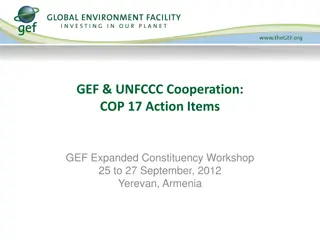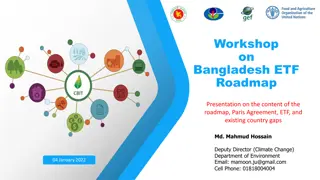Comprehensive Guidelines for Hypertension Management in Canada 2020
The Hypertension Canada's 2020 Comprehensive Guidelines provide insights on prevention, diagnosis, risk assessment, and treatment of hypertension in adults and children. The guidelines emphasize standardized blood pressure measurement, risk factors, and the use of out-of-office monitoring for accura
2 views • 62 slides
What Are SEMA Racking Inspection Guidelines?
SEMA racking inspection guidelines are the gold standard of the racking safety industry.\n\nWithout SEMA racking inspection guidelines, guaranteeing the safety of any warehouse would be impossible. The advice laid down by SEMA is often echoed by HSE and \u2014 in some cases \u2014 it becomes law. So
1 views • 2 slides
2023 CPG Obesity Guidelines: Application in Primary Care and Impact on Pediatric Health
Application of the 2023 CPG Obesity Guidelines in primary care is crucial due to the increased prevalence of obesity among children, with 19% affected in the US. This guideline update is necessary as the last guidelines were published in 2007 and there is now more data available, including RCTs and
5 views • 23 slides
DPI Auditor Insights and State Audit Guidelines Overview
This collection of images and descriptions provides insights into DPI Auditor activities, state audit guidelines, and updates related to state major program determinations. The State Single Audit Guidelines for Wisconsin School Districts are highlighted, along with the State Audit Manual overview an
3 views • 36 slides
Leica Social Media Guidelines Overview
The Leica Social Media Guidelines aim to create a consistent brand image across all social media channels globally, emphasizing key values such as recognition, voice share, and local content support. The guidelines cover the philosophy behind Leica, establishing a social media presence, channel over
2 views • 61 slides
Understanding International Climate Agreements and Governance
Delve into the intricacies of global climate governance with a focus on the Paris Agreement, UNFCCC history, key commitments, and the Kyoto Protocol. Explore the evolution of international fora and the concerted efforts to address climate change through mitigation, adaptation, and cooperation.
0 views • 73 slides
Best Practice Guidelines for Saskatchewan Health Authority PowerPoint Presentations
The Saskatchewan Health Authority has specific guidelines for creating PowerPoint presentations to ensure consistent branding. These guidelines include using the correct font, font size, color scheme, and layout. It also emphasizes the proper use of logos, images, and charts while maintaining a prof
1 views • 13 slides
Workshop on Adaptation Reporting under the UNFCCC and Paris Agreement
Workshop on Adaptation Reporting through the Biennial Transparency Reports and related work by the Adaptation Committee under the UNFCCC and the Paris Agreement, focusing on arrangements for reporting and communicating adaptation information. The workshop covers various initiatives, guidelines, and
0 views • 7 slides
Post-COVID-19 Operational Guide for PCR Inc.
The operational guide outlines safety protocols for PCR Inc. post-COVID-19, emphasizing a 50% capacity limit, presence of a certified food manager on-site, adherence to social distancing guidelines, frequent sanitation of high-touch surfaces, and mandatory mask-wearing. Employees are required to wea
2 views • 7 slides
Earth Observation for UNFCCC Paris Agreement Meeting
Introduction to Session 3 of the 10th CCI Colocation Meeting on Earth Observation for UNFCCC Paris Agreement. The session covers presentations, breakout sessions, and discussions on how Earth Observation can support the implementation of the Paris Agreement through case studies and future research d
2 views • 7 slides
Enhancing CO2 Absorption Through Prioritizing Agriculture in UNFCCC Deliberation
COP 24 aims to address the challenges of global warming but faces obstacles in reducing CO2/GHG emissions. Emphasizing agriculture as a key solution due to its CO2 absorption capabilities can lead to breakthroughs. Implementing measures like modern technology in agriculture and promoting initiatives
1 views • 12 slides
Evidence-Based Guidelines for Bronchiolitis in Children: Diagnosis, Management, and Prevention
Bronchiolitis is a common viral illness in infants characterized by lower respiratory tract inflammation. The American Academy of Pediatrics released updated guidelines in 2015 for children aged 1-23 months, focusing on evidence-based approaches for diagnosis, prevention, and management. The guideli
3 views • 30 slides
Proposed Ratification of the Kigali Amendment to the Montreal Protocol
South Africa seeks Parliament's approval to ratify the Kigali Amendment to the Montreal Protocol, targeting the phase-down of hydrofluorocarbons (HFCs) to protect the ozone layer. The amendment requires new reporting on HFC production, imports, and exports, with different baselines for developing co
0 views • 10 slides
Guidelines for Management of Pediatric Venous Thromboembolism
This educational slide set presents the American Society of Hematology's 2018 guidelines for the treatment of pediatric venous thromboembolism. The guidelines cover various aspects such as prevention, treatment, and optimal management of anticoagulation therapy in pediatric patients. Panels were for
0 views • 47 slides
Surge Deployment Guidelines and Standard Operating Procedures
Surge Deployment Guidelines and Standard Operating Procedures outline the principles and processes for deploying specialized personnel to support humanitarian operations in various emergencies. The guidelines aim to ensure equal opportunity, transparent processes, and quality responses among Red Cro
0 views • 12 slides
Guidelines and Setup for Hybrid Speech Contests
Overview of guidelines for organizing hybrid speech contests, including format guidelines to follow, definitions of online and hybrid contests, and detailed instructions for contest setup in both online-only and hybrid configurations. The guidelines cover aspects such as selecting contest formats, a
3 views • 13 slides
Mainstreaming HIV and AIDS in Uganda: Guidelines and Initiatives
The presentation by Quinto Rwotoyera from Uganda AIDS Commission discusses the national guidelines for mainstreaming HIV and AIDS in all sectors in Uganda. The content covers the existing policy and guidelines, overview of the presidential FastTrack initiative, objectives of the guidelines, users of
0 views • 28 slides
Addressing Economic Inequality in the Face of Climate Change Challenges
This discussion highlights the complex issue of economic inequality within and between countries in the context of climate change. It emphasizes the importance of inclusive participation and equality in achieving the Sustainable Development Goals. Various dimensions of inequality, including economic
0 views • 23 slides
Safeguard Requirements in REDD+ Implementation: UNFCCC and FCPF Perspectives
Safeguard requirements in REDD+ projects involve various approaches and processes from entities like bilateral donors, the Green Climate Fund, project-level standards, and more. The challenge lies in integrating these multiple requirements into a coherent national approach to ensure efficiency and r
0 views • 12 slides
NAP Technical Guidelines Overview
The NAP Technical Guidelines offer a structured approach for countries to navigate the National Adaptation Plan process, focusing on key elements such as groundwork, gap analysis, implementation strategies, and monitoring. These guidelines provide activities, steps, and questions to guide the formul
0 views • 17 slides
Albanian National Communication on Climate Change: Preliminary Results and Projections
The Albanian National Communication to the UNFCCC presents preliminary results on greenhouse gas emissions from various sectors such as energy, transport, agriculture, and waste between 2000-2009. It also outlines the expected changes in temperature, precipitation, and sea level rise, along with int
0 views • 7 slides
UAMS Travel Management Guidelines FY22
UAMS Travel Management provides guidelines for submitting, processing, and approving travel expenses efficiently. The guidelines emphasize proper coding, T-card details, trip resubmission through Workflow, and the requirement of a Justification to Open Closed Trip form. Prior approvals for expenses,
0 views • 52 slides
Requirements and Progress in REDD+ Implementation
Understand UNFCCC and GCF requirements for REDD+ implementation, including the need for national communications and summaries of information. Learn about the structure of summaries, safeguard considerations, eligibility criteria, and lessons from past experiences in developing summaries.
0 views • 9 slides
Climate Change Monitoring, Reporting, and Verification (MRV) Training Session Overview
This document outlines the purpose and reporting requirements for the development of a Climate Change Monitoring, Reporting, and Verification (MRV) system, focusing on projections and scenarios. It highlights the importance of collecting information for climate mitigation, assisting Serbia in meetin
0 views • 19 slides
The Role of Energy Statistics in Greenhouse Gas Emissions Inventory - Finnish Perspective
Highlighting Finland's national greenhouse gas inventory system guided by the UNFCCC and Kyoto Protocol requirements. Emphasis on the significance of energy statistics in compiling accurate emissions data, ensuring transparency, collaboration with key entities, and adherence to reporting guidelines
0 views • 11 slides
Climate Change and Development in Africa: A Journey from Kyoto to Paris
The journey of climate change negotiations in Africa, from key milestones in the climate change regime to the role of African institutions and bodies, such as the African Union and African Ministerial Conference on the Environment. Highlights include the entry into force of the UNFCCC, the adoption
1 views • 15 slides
Overview of Calculation Tools for Mitigation Data Analysis Program under UNFCCC Secretariat
This content discusses various calculation tools used in the Mitigation Data Analysis program of the UNFCCC Secretariat. It includes tools for GHG projections, financial support, and their integration into Country briefs to facilitate accurate data presentation and reduce workload during reviews. De
0 views • 7 slides
Global Efforts and Challenges in Climate Change Agreements
Explore the evolution of international climate change agreements, from the birth of UNFCCC to the success of the Montreal Protocol. Analyze key questions on actor involvement, policy advising, societal needs reconciliation, and scientific knowledge application. Delve into the UN's role, civil societ
0 views • 17 slides
Climate Change Technology Needs Assessment Workshop in Cambodia
The UNFCCC Workshop on Technology Needs Assessments in Cambodia focused on organizing for TNA, identifying development priorities related to climate change, and utilizing technology analysis and prioritization tools. The workshop highlighted the importance of national coordination, institutional str
0 views • 19 slides
Reviewing Practices for New Policies and Measures Implementation in Climate Change Reporting
The report focuses on the review approaches for assessing information solely on new policies and measures (PaMs) implemented or planned since the previous review meetings in relation to climate change mitigation actions. It highlights the importance of transparent reporting of PaMs to achieve econom
0 views • 10 slides
International Legal Framework and Climate Change Challenges
The international legal framework for addressing climate change, including the UN Framework Convention on Climate Change (UNFCCC) and the Kyoto Protocol, aims to mitigate greenhouse gas emissions and promote adaptation measures. Despite efforts, progress has been slow with challenges in meeting targ
0 views • 60 slides
Overview of Green Climate Fund Initiatives
The Green Climate Fund (GCF) is a key financial mechanism under the UNFCCC and the Paris Agreement, with a portfolio comprising 35 projects/programs funded at USD 1.5 billion. It aims to address climate change through various sectors like energy access, transport, forestry, livelihoods, health, infr
0 views • 14 slides
NAMA Development and International Support in Malaysia
The UNFCCC Workshop in Bonn discussed NAMAs in Malaysia, focusing on national frameworks, prioritization, sectoral assessments, and international support. Various NAMA projects were highlighted, including peat swamp forest management, e-waste management, electric mobility, CDM projects, and low carb
0 views • 15 slides
Overview of NAMAs in the Buildings and Residential Sector
This presentation delves into the specifics of NAMAs (Nationally Appropriate Mitigation Actions) within the context of the buildings and residential sector. It covers the origins and evolution of NAMAs, negotiations under the UNFCCC, and the implementation actions related to NAMAs. The content also
0 views • 23 slides
Challenges and Milestones in Reviewing Biennial Reports and National Communications in the UNFCCC Process
Reviews of Third Biennial Reports and Seventh National Communications face challenges in securing supplementary resources, timely submission, and sustaining a pool of qualified experts. The UNFCCC secretariat is coordinating 44 reviews in the 2018-2019 cycle, with 22 reviews dependent on additional
0 views • 13 slides
International Indigenous Peoples Forum on Climate Change (IIPFCC) Engagement Framework
The IIPFCC is a platform where indigenous peoples globally come together during UNFCCC negotiations to voice their concerns and shape outcomes. The forum provides a safe space for consensus-building on shared issues. Co-chaired by representatives from different regional groupings, the IIPFCC operate
0 views • 14 slides
Understanding Medical Guidelines and Their Impact on Healthcare Practices
Medical guidelines play a crucial role in guiding decisions related to diagnosis, management, and treatment in healthcare. They are generated through a structured process involving data collection, evidence prioritization, and consensus among experts. These guidelines, whether at national, regional,
0 views • 16 slides
Importance of Space-based Observation for Climate Action & the Paris Agreement
Utilizing space-based observation data is crucial for supporting the Paris Agreement and achieving sustainable development goals related to climate action. Observations play a key role in formulating commitments, assessing policies, and conducting research for combating climate change, as outlined i
0 views • 12 slides
Overview of GEF-UNFCCC Cooperation and COP 17 Action Items
GEF, as an Operating Entity of the UNFCCC, plays a crucial role in supporting non-Annex I Parties in various climate change initiatives. The COP 17 decisions relevant to GEF include long-term cooperative actions, technology mechanisms, and the Green Climate Fund. GEF is tasked with providing support
0 views • 13 slides
Bangladesh ETF Roadmap Presentation on Paris Agreement and Country Gaps
The workshop on Bangladesh ETF roadmap delves into the country's national circumstances, climate policies, and UNFCCC reporting obligations. It outlines gaps in the national GHG inventory, monitoring, reporting, and NDC updates. The roadmap emphasizes transitioning to ETF, BTR readiness, and enhanci
0 views • 13 slides
